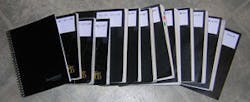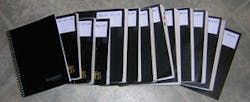Speaking journally...
It has been this OGJ editor’s habit-well, at least since Jan. 10, 2001-to keep a journal at work. The practice began as a way to avoid misplacing important work-related information.
Before that date, vital data such as contacts’ phone numbers, story ideas, print deadlines, and notes from staff meetings and interviews were written on anything handy. And since this information always attached itself to scrap pieces of paper or on pages of countless notepads, it was easily lost and, dare say, most times forgotten.
The mounting organizational challenge led to a decision to confine important work-related notes to a central place. Voilà! This editor’s habit of keeping work journals was born.
I say “journals” because there are now 13 of these roughly 80-page books. Twelve have been filled, and the current one is close to being so. On each journal’s black cover is the time period of the writings within-most hold about 6 months’ worth of notes.
These notebooks have accompanied their owner to every conference, interview, and staff meeting attended over the last 6 years. The current journal is always within arm’s reach, open on the desktop, every day.
Historical reference
Organizational advantages aside, what’s most interesting about this method of record-keeping is the historical perspective gained by leafing through past journals and reading the various dated entries. This is where certain questions find their answers: What was happening 5 years ago in the oil and gas industry that was making headlines? Who was being interviewed and why? Which story ideas never made it to fruition? Which ideas did?
After recently rereading parts of these journals, certain entries stood out from others. One entry in particular jarred this editor’s nerves and with them, some horrible memories. The date was Sept. 11, 2001, and the event was the succession of terrorist attacks on New York and Washington, DC.
Like most people, this editor was completely numbed by the events of that day and was unsure of what to do: Leave work? Stay? And accomplish what, exactly?
As the horrific story unfolded slowly throughout that day, OGJ staffers at the time were gaining an understanding of the day’s events and had plans to report collectively on how industry would be affected by the attacks. The consolidated story would be published on OGJ Online, the real-time news area of which at that time was only a few months old.
Written in my journal under that infamous date were notes for an assignment given me by a senior editor: “Call London. Ask IPE president how markets will be affected by attacks. Taking any security precautions?”
Upon making the call to London and asking my questions-armed with nothing but a sick, hopeless feeling in the pit of my stomach-I recall being told in the nicest way possible that how the attacks would affect oil markets was “the furthest thing” from the then-International Petroleum Exchange president’s mind.
I came away with nothing to contribute to the online story that day and remember leaving work feeling exhausted, emotionally and mentally. Looking back, this writer finds it amazing that all of these vivid memories come flooding back from a single note in a journal.
Other entries
Other entries, although not carrying quite the same emotional weight, are poignant.
These entries range from the pragmatic-“Jan. 18, 2001: Need to call Colo. Attn. Gen. office for photo of Gale Norton” (US secretary of the interior during 2001-06) and “Feb. 8, 2001: Start contacting analysts about 4Q/2000 earnings”-to the inquisitive-“Sept. 12, 2003: Ongoing story...How can US gas producers turn around production decline?”
These journals serve as a record-albeit a personal one-for industry events. For example, turn to the notes taken during the first week of May of every year and read the last 7 years of speaker coverage during the Offshore Technology Conference held every year in Houston at that time.
One of the most satisfying aspects of keeping a work journal, however, is crossing things off “to do” lists. Prime example: “June 6, 2007: Finish writing journally speaking for June 11 issue.”
Check.

